World music, compiled by Kees Schuil.
“Music from Ivory Coast, with Ernesto Djédjé and other Ivorian artists.”
In Ivory Coast, as in most African countries, many different peoples live, each speaking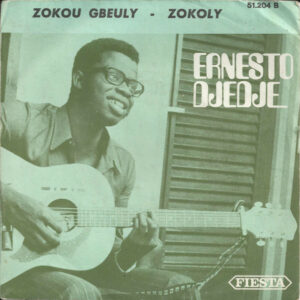 their own language. But unlike countries like Ghana, Togo, and Benin, Ivory Coast does not have a language that the majority of the population speaks. Therefore, French is more important in Ivory Coast, and many songs are sung in French.
their own language. But unlike countries like Ghana, Togo, and Benin, Ivory Coast does not have a language that the majority of the population speaks. Therefore, French is more important in Ivory Coast, and many songs are sung in French.
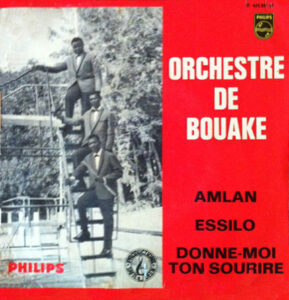 The largest population group in Ivory Coast is the Baoulé. They belong to the Akan peoples, like the Ashanti, Fanti, Brong, Akwapem, Akyem, and Nzima from Ghana, and the Anyi and Andô from Ivory Coast. The first president of Ivory Coast, Félix Houphouët-Boigny, was Baoulé. Their area of residence is in the middle of Ivory Coast, with cities like Yamoussoukro and Bouaké, the second largest city in the country.
The largest population group in Ivory Coast is the Baoulé. They belong to the Akan peoples, like the Ashanti, Fanti, Brong, Akwapem, Akyem, and Nzima from Ghana, and the Anyi and Andô from Ivory Coast. The first president of Ivory Coast, Félix Houphouët-Boigny, was Baoulé. Their area of residence is in the middle of Ivory Coast, with cities like Yamoussoukro and Bouaké, the second largest city in the country.
The Orchestre de Bouaké is led by Louis Pierre. In 1966, they released an Afro-Cuban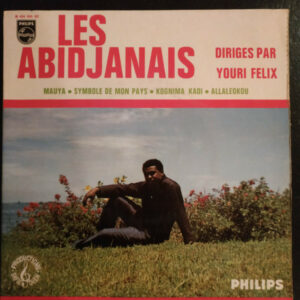 version (rumba) of a famous song by the French-Corsican singer Tino Rossi, “Donne-moi ton sourire”. They combine African music styles such as highlife with calypso and Cuban styles such as son, charanga, pachanga, cha cha cha, and rumba.
version (rumba) of a famous song by the French-Corsican singer Tino Rossi, “Donne-moi ton sourire”. They combine African music styles such as highlife with calypso and Cuban styles such as son, charanga, pachanga, cha cha cha, and rumba.
The Les Kantadors De La Capitale orchestra and the Orchestre Les Abidjanais also combine Afro-Cuban rhythms with African music styles such as highlife.
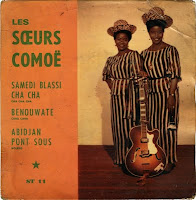 The sisters Mandiara and Mariam N’Goran come from Koffi-Amonkro, a village near M’Bahiakro, a city east of Bouaké. They are from the Andô community. As early as 1960, on the eve of Ivory Coast’s independence, Mathieu Ekra, the then Minister of Information, discovered the singing talent of these sisters during a singing competition. Their fresh and clear
The sisters Mandiara and Mariam N’Goran come from Koffi-Amonkro, a village near M’Bahiakro, a city east of Bouaké. They are from the Andô community. As early as 1960, on the eve of Ivory Coast’s independence, Mathieu Ekra, the then Minister of Information, discovered the singing talent of these sisters during a singing competition. Their fresh and clear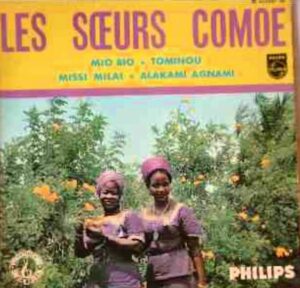 voices reminded people of the water of the Comoé River. Therefore, they are usually referred to as the Comoé sisters, “Les sœurs Comoé”. Their songs are based on sayings and music of the Akan.
voices reminded people of the water of the Comoé River. Therefore, they are usually referred to as the Comoé sisters, “Les sœurs Comoé”. Their songs are based on sayings and music of the Akan.
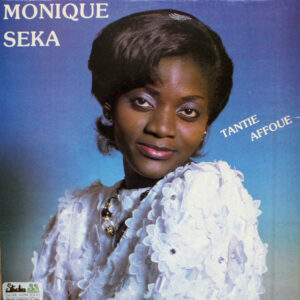 Monique Séka was born on November 22, 1965. She combines African music with Zouk, and her music style is called Afro-Zouk. Hence her nickname, “Queen of Afro-Zouk.” In 1985, she released her first album, “Tantie Affoué.” The guitarist in her orchestra is Jimmy Hyacinthe, a well-known singer from Ivory Coast, who also played guitar for the Comoé sisters. Monique Séka represents the third generation of a
Monique Séka was born on November 22, 1965. She combines African music with Zouk, and her music style is called Afro-Zouk. Hence her nickname, “Queen of Afro-Zouk.” In 1985, she released her first album, “Tantie Affoué.” The guitarist in her orchestra is Jimmy Hyacinthe, a well-known singer from Ivory Coast, who also played guitar for the Comoé sisters. Monique Séka represents the third generation of a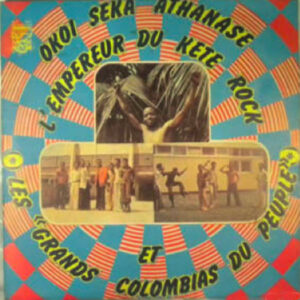 musical dynasty. She was trained by her father, Okoï Séka Athanase. He first sang with l’Orchestre de la Fraternité Ivoirienne de Bouaké, then with the Audiora orchestra, the Orchestre National de Côte d’Ivoire, and the orchestra Les Grands Colombias Du Peuple.
musical dynasty. She was trained by her father, Okoï Séka Athanase. He first sang with l’Orchestre de la Fraternité Ivoirienne de Bouaké, then with the Audiora orchestra, the Orchestre National de Côte d’Ivoire, and the orchestra Les Grands Colombias Du Peuple.
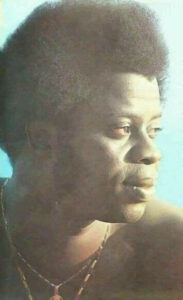 The guitarist and singer Loué Ernest Djédjé was born in 1947 in Daloa, in the southwest of Ivory Coast, in the area of the Bété people. His mother is Bété, but his father is a Wolof from Senegal. At the age of fifteen, he played in the local band “Les Éléphants de Bouaké”. Then he was approached by Pierre Amédée. Pierre Amédée is
The guitarist and singer Loué Ernest Djédjé was born in 1947 in Daloa, in the southwest of Ivory Coast, in the area of the Bété people. His mother is Bété, but his father is a Wolof from Senegal. At the age of fifteen, he played in the local band “Les Éléphants de Bouaké”. Then he was approached by Pierre Amédée. Pierre Amédée is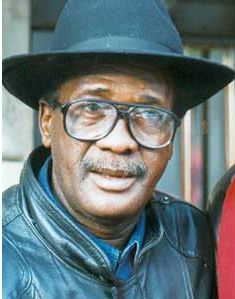 also from southwestern Ivory Coast, born as Nahounou Digbeu Amédée on March 30, 1937, in Pataïdé, in the area of the Krou. In 1962, Pierre Amédée recruited Djédjé as a guitarist for his orchestra Ivoiro Stars. There, Djédjé became the band leader until he suddenly left for Paris in 1968 to study information theory. He continued playing music there, and because he mainly played Afro-Cuban music, he changed his name to Ernesto Djédjé. In 1972, he returned to Ivory Coast. There, he modernized a traditional Bété dance from his hometown, the Ziglibithy. He named the orchestra he founded Les Ziglibithiens. With this band, he recorded his most famous song in Lagos in 1973, “Ziboté”. The lyrics of this song are:
also from southwestern Ivory Coast, born as Nahounou Digbeu Amédée on March 30, 1937, in Pataïdé, in the area of the Krou. In 1962, Pierre Amédée recruited Djédjé as a guitarist for his orchestra Ivoiro Stars. There, Djédjé became the band leader until he suddenly left for Paris in 1968 to study information theory. He continued playing music there, and because he mainly played Afro-Cuban music, he changed his name to Ernesto Djédjé. In 1972, he returned to Ivory Coast. There, he modernized a traditional Bété dance from his hometown, the Ziglibithy. He named the orchestra he founded Les Ziglibithiens. With this band, he recorded his most famous song in Lagos in 1973, “Ziboté”. The lyrics of this song are:
Brothers and sisters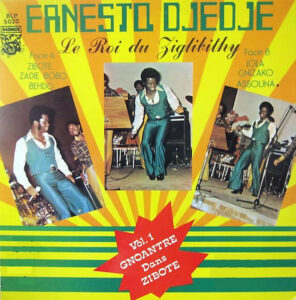
Let’s dance together
Let’s sing together
But let’s be vigilant at the same time
Because danger and harm are not far away
That comes from our false friends
False friends are often more dangerous than enemies
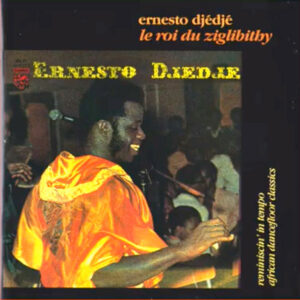 The song “Behido” is about “the decline of our morals and traditions since the arrival of the white man.”
The song “Behido” is about “the decline of our morals and traditions since the arrival of the white man.”
Les Ziglibithiens was dissolved in 1980, but a year later, Ernesto Djédjé founded a new band.
In 1983, Ernesto Djédjé died suddenly from the effects of an untreated ulcer, although many, including his mother, claim that he was poisoned.
The singer Daouda Koné was born in 1951 in Niangoloko, in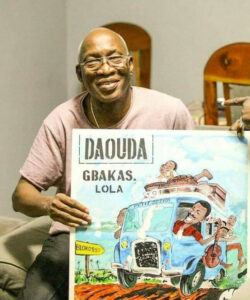 Upper Volta, now Burkina Faso. After studying engineering in France, he got a job at Radio and Television in Ivory Coast and then started a career as a singer.
Upper Volta, now Burkina Faso. After studying engineering in France, he got a job at Radio and Television in Ivory Coast and then started a career as a singer. 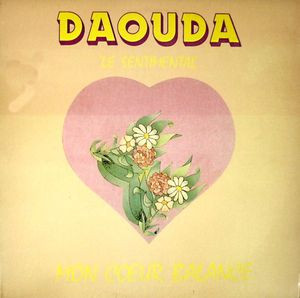 He mostly sings in French, and his lyrics are mostly about relationships between men and women. Hence his nickname “Daouda le Sentimental”.
He mostly sings in French, and his lyrics are mostly about relationships between men and women. Hence his nickname “Daouda le Sentimental”.
In “Mon Cœur Balance,” his heart wavers because he cannot choose between two girls, the fun Fanta and the kind Amina.
Thanks to Muziekweb in Rotterdam.
![]()
And to Harm van der Wal, for providing his African CDs.
- Ernesto Djédjé: Mamadou Coulibaly, auteur: E. Djédjé, Single Mahoro, 1973,
Fiesta 51.202 B, 3’09 - Pierre Amédée & Ivoiro Stars: Bida Zougou, auteur: Pierre Amédée,
EP Bou Grou Nekpra, Philips / Safie Deen 424.653 BE, 3’16 - Ernesto Djédjé & Les Ziglibithiens: Zibote, auteur: Djédjé,
LP Vol.1 Gnoantre Dans Zibote, 1977, Badmos BLP 5020, 4’44 - Ernesto Djédjé & Les Ziglibithiens: Behido, auteur: E. Djédjé,
LP Vol.1 Gnoantre Dans Zibote, 1977, Badmos BLP 5020, 3’16 - Ernesto Djédjé: Zouzoupale, auteur: E. Djédjé,
LP Zouzoupale, 1981, SIIS 0030, 3’07 - Les Abidjanais: Kognima Kadi, auteur: Youri Félix,
EP Mauya, Philips / Safie Deen 424 665 BE, 2’31 - Les Kantadors De La Capitale: Badjamin Main Ho, auteur: Bony Tchrewa Pascal,
LP Ma Katji Kplouaba, Djima Records DAD 969, 3’07 - Orchestre de Bouake: Donne-moi ton sourire, auteur: Louis Pierre,
EP Amlan, 1966, Philips / Safie Deen 424 681 BE, 2’38 - Les Sœurs Comöe: Abidjan Pont Sous, auteur: Les Sœurs Comöe,
EP Samedi Blassi Cha Cha, Star (4) ST 11, 4’40 - Les Sœurs Comöe: Missi Milai, auteur: Les Sœurs Comöe,
EP Mio Bio, 1967, Philips / Safie Deen 424 687 BE, 2’54 - Les Sœurs Comöe: Mio Bio, auteur: Les Sœurs Comöe,
EP Mio Bio, 1967, Philips / Safie Deen 424 687 BE, 2’34 - Daouda: Gbakas d’Abidjan, auteur: Daouda Tou Kone,
EP Daouda Le “Sentimental”, 1978, Maikano MAI LPS 1003, 3’27 - Daouda: Mon Cœur Balance, auteur: Daouda Tou Kone,
LP Le Sentimental, 1978, Maikano MAI LPS 1002, 5’17 - Monique Séka: Tantie Affoué, auteur: Monique Séka,
LP Tantie Affoué, 1985, Djouhan Legnanthin Productions DT 001, 3’22 - Okoi Séka Athanase & Les Grands Colombias Du Peuple: Assia Kobe Michel Bin, auteur: Okoi S. Athanase, LP L’Empereur Du Kete Rock, 1977, Badmos BLPS 5025, 8’31








